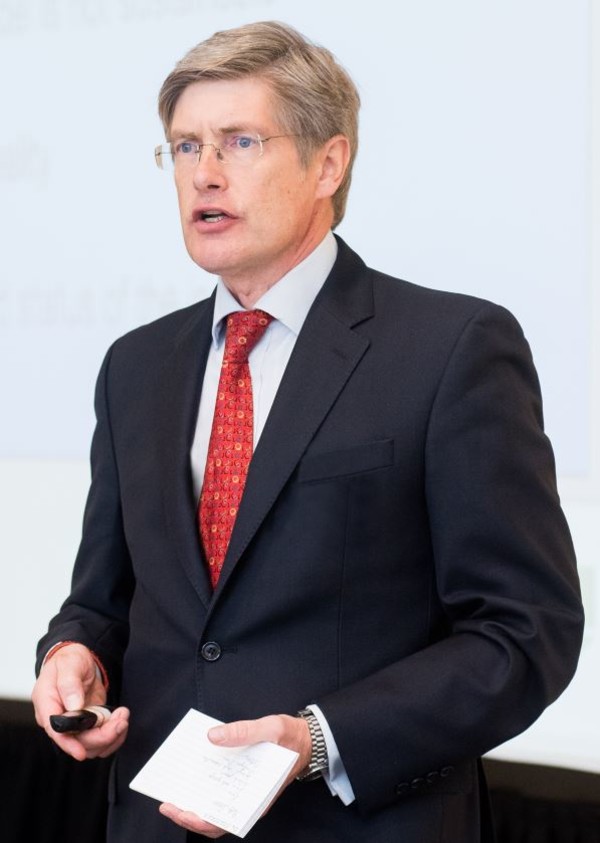In this edition we catch up with James Herbert, Secretary General of the International Salvage Union.
For those not familiar with the ISU, can you explain its primary role?
The ISU is the global trade association for marine salvage contractors. We have some fifty full members who are capable of acting as main contractors in emergency response or wreck removal operations. We also have about 75 associate members who have an interest in the salvage sector but are not main contractors such as consultancies and law firms, brokers, insurers and equipment suppliers. We also have 14 affiliate members – mostly similar trade associations and this includes IUMI.
ISU promotes the value of the salvage industry; develops policy and negotiating positions on behalf the whole industry and works on codes of practice, standard contracts as well as working with bodies like IMO – where we have official NGO status.
And what is your role at the ISU?
I am the Secretary General and I work with a part time assistant and our legal adviser, Richard Gunn, who is a master mariner and partner at Reed Smith.
I am responsible for running the association and its finances and looking after the membership but most importantly engaging with our key stakeholders – shipowners, property insurers and the P&I Clubs. I also handle all communications, drafting articles, writing speeches, liaising with media and managing our website and socials. And I organise our annual conference and dinner in London and the Annual General Meeting in a different part of the world each year.
With such a small secretariat the ISU President, John Witte of Donjon Marine, and Vice President, Leendert Muller of Multraship, play a significant role in the ISU and representing the industry and they commit much energy and time to their roles, travelling widely to give presentations and join conference panels.
What is top of the ISU’s current agenda?
At the highest level it is ensuring that the salvage industry is financially sustainable. All parties agree that the availability of a professional, commercial salvage sector with a presence around the world is essential to be ready to intervene to save life, protect the environment, save property and keep ports open and trade flowing. But the amount of salvage work has contracted over the years so our members have concerns about their income. At the same time insurers are concerned about costs. We ask that when considering salvage services insurers should celebrate the values that we preserve rather than focus on the cost.
Promoting the use of the Llyod’s Open Form contract (LOF) and helping the shipping industry to understand the importance of Article 13 awards as the cornerstone of the funding of the industry is important.
Working with the Clubs to ensure a fair and transparent regime for wreck removal is a focus as well as ensuring the SCOPIC regime remains fit for purpose.
Operationally, fires on boxships, RoRos and car carriers are a concern enhanced by worries about electric vehicles and lithium ion batteries. Future fuels is a matter we need to focus on as well and these subjects are important for IUMI, too, and we need to collaborate where we can.
What impact has the ISU had on international shipping in recent years?
I am bound to say that the key impact is that our members provide about 200 services each year to casualty vessels, often preserving significant value and preventing much loss for property insurers.
Another impact is the prevention of pollution. Our annual survey shows that in a typical year, ISU members provide services to vessels carrying about 1.5 million tonnes of pollutants which, without intervention, might be at risk of going into the sea.
Other impacts include playing a significant part in helping IMO to adopt revised guidelines on Places of Refuge; helping to preserve LOF and improving our relations with insurers and owners. We have also finalised the revised BIMCO Wreckstage contract and revised the SCOPIC regime’s Special Casualty Representatives’ Guidelines. These things might seem niche but are really important in salvage and wreck removal.
Can you explain the relationship between the ISU and IUMI?
ISU and IUMI have an excellent working relationship based on mutual respect and a recognition that our interests are interlinked despite the great asymmetry of scale between our two sectors. Lars Lange, my IUMI counterpart, and I meet and speak from time to time and we try to work cooperatively and with respect even when there are differences of opinion on issues or policy.
On a personal level, how did your career take you an involvement with the ISU and why do you do it?
I started my career as a British Army officer nearly 40 years ago! Then I trained as a journalist and worked as a current affairs broadcast journalist for the BBC for a number of years before moving to the energy sector where I was head of global media relations for the Shell Group. In this capacity I did lots of emergency response work with the shipping unit and after a spell as a senior civil servant I founded my own marine communications business. One of my clients was ISU and I served as ISU communications adviser for 14 years before becoming Secretary General in 2022.
And what do you like to do away from the office?
I like outdoor activities and in particular mountaineering and rowing which I started two years ago. I really enjoy the combination of being on the river, focusing on good technique and the fitness regime it requires to try to keep up with the younger members of the squad. I also love music and reading.
